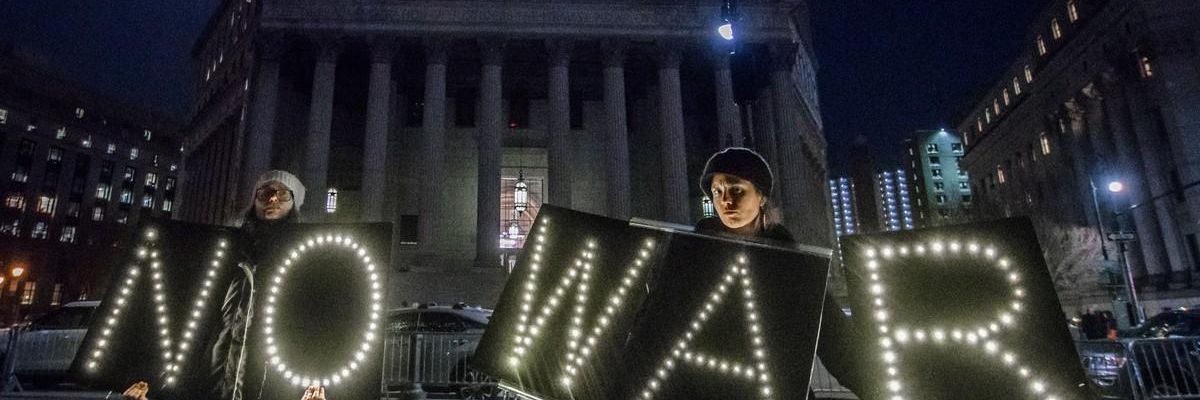We are a movement of feminist leaders united by our values of social justice, equality, and compassion. Many of us are from peoples that have survived U.S. genocide, slavery, invasion, and military occupation. We stand united in our commitment to building a United States and a world free of militarism and war.
On the 20th anniversary of the War on Terror, we oppose the continued use of U.S. military aggression against Afghanistan, across the Middle East, and all countries the U.S. has targeted. We remain concerned for the safety and dignity of Afghan people, especially women, because we know all too well that invading militaries have never liberated women. We reject the selective feminist agendas that focus on Afghan women's rights only when it aligns with imperialist US policy. We oppose the white savior mindset that has justified regime change wars under the banner of human rights and democracy. We call for a feminist approach to repairing the harms inflicted on the Afghan people that addresses refugee rights, material reparations, support for human rights defenders, and social redress in the immediate and long term.
We call on the United States to take full responsibility for the harm and destabilization caused by the 20-year occupation of Afghanistan; for making countries such as Iraq, Iran, North Korea, Libya, Syria, and Yemen subsequent targets of U.S. aggression and militarism; and for continuing to support apartheid Israel. These wars, military actions, and counter-terrorist activities, which the U.S. is waging now in 85 countries, have cost U.S. taxpayers a staggering $8 trillion since 9/11. More than 929,000 people have been killed, and since 2001, 38 million people have been displaced by U.S. wars.
The War on Terror has devastated communities, with particular effects on women. They have been subjected to bombings, gunfire, and drone strikes that have destroyed their cities and homes, and sanctions that have cut off the basics needed for survival. The War on Terror has also increased women's exposure to sexual violence--which has always been used by militaries as part of their colonization strategy. Furthermore, the War on Terror has lined the pockets of oil companies and military contractors while cutting budgets for women's and family social services, which has led to increased poverty in our communities.
These post-9/11 wars saw the expansion of the power of border patrol and police, making women of color and immigrants more vulnerable to arrest, detention, and imprisonment. This was compounded by the Patriot and Homeland Security Acts, which increased racial profiling, surveillance, detentions, and imprisonment, disproportionately harming South Asian, Arab and Muslim, Indigenous land rights defenders and immigrant communities. But everyone--particularly other Black and Brown communities--have had their civil liberties curtailed under the guise of "national security."
Instead of working to scale back U.S. wars amid a global pandemic and worsening economic crisis, the military-industrial complex is calling for more military spending. Democrats have increased the Pentagon budget to a staggering $740 billion, locking the United States into maintaining 800 military bases around the world, which are poised for offensive interventionist wars while destroying local ecosystems.
Now more than ever we need a radical transformation of militarized security to a system that creates genuine security. As transnational feminists united against militarism and war, we call for a new U.S. foreign policy that recognizes interdependence and prioritizes connection and cooperation, reparations for historic and systemic harms, valuing people and the planet over profit, and protecting everyone, especially those made most vulnerable. Our communities are organized and ready to democratize U.S. foreign policy, not only for our collective security here at home, but for the future of all peoples and our planet. The Biden administration must follow the leadership of our social movements, who are calling for U.S. accountability, a redistribution of economic and political priorities, and a reparative approach:
1.) We call on the U.S. to end wars, cut the Pentagon budget, and invest in our collective security by prioritizing funding for housing, food security, climate change adaptation and resilience, equitable healthcare, and access to education. This requires ending militarism and the ways it reinforces every form of U.S. state violence such as policing and prisons, immigration bans, and the theft of indigenous lands.
2.) We call for reparations to the people and countries that have been devastated by U.S. wars and militarism, re-directing funds allocated for wars to supporting development, health and education, especially funding women's groups and feminist networks in those countries devastated by U.S. wars, as critical to strengthening democratic movements.
3.) We call for democratizing U.S. foreign policy away from endless war towards one where the United States can peacefully coexist with other nations without domination, occupation, or war. This requires the mobilization of diaspora communities to raise our voices on the impact of U.S. militarism and war on our families and homelands, as well as systematic processes to garner more collective input from communities most impacted by U.S. foreign policy.




